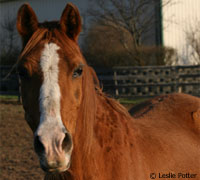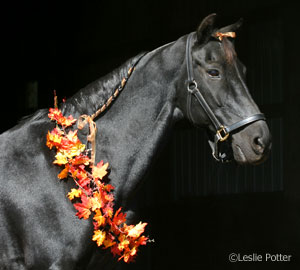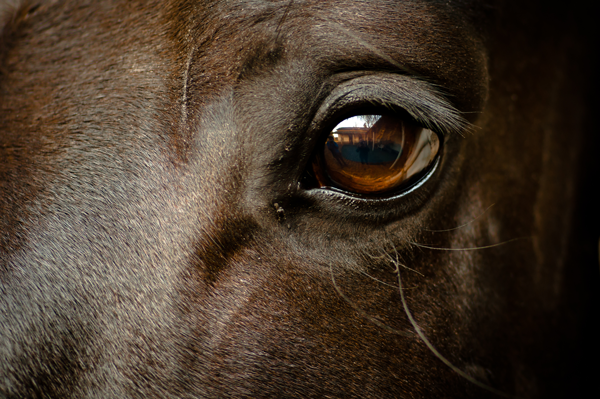
As your horse reaches his twenties, you’ll likely notice some changes as he slows down in his senior years. Just like humans, an older horse may experience arthritis, begin to have some decline in vision and hearing, and generally slow down. As the owner of an older horse, it is important to watch for signs of dental problems, too.
Unlike humans, horses have hypsodont teeth, meaning that they continue to erupt from the gum after forming. As horses graze and chew, they naturally wear down their teeth. In the wild, a schedule of nearly constant grazing, along with abrasion from the dirt and twigs picked up along with the grass, keeps a horse’s teeth fairly evenly worn. However, many domestic horses eat grain and clean hay and get their food at mealtimes rather than in a constant stream of forage. This alters the way the teeth wear and is one of the main reasons why lifelong dental care is so important.
Advancements in horse care and veterinary treatment have lead to a longer lifespan for domesticated horses. This means older horses may outlive the lifespan of their teeth, which makes staying ahead of problems even more essential as a horse reaches his mid- to late twenties and beyond.
Adult horses should have an annual dental exam, and will typically have their teeth floated, or filed down to get rid of any sharp points or edges, during that exam. When a horse reaches his late teens or twenties, those exams should be increased to once every six months. Not all senior horses will need their teeth floated that frequently—in fact an older horse with a history of good dental care may need less frequent floating than a horse whose teeth are still erupting. But the semi-annual dental exams are essential to stay ahead of other potential age-related dental problems, such as loose teeth and gum disease.
To learn more about problems caused by uneven wear, please complete the Equine Dental Care Basics course.
Side Effects of Poor Dental Health
One of the most common signs of problems with a senior horse’s teeth is quidding. Quidding is a term for dropping hay or grass and is easily recognized by unchewed wads of forage around the horse’s stall or eating area. A horse may be unable to chew forage effectively because of excessive wear on the teeth, or because sharp edges make it painful to chew. Instead of chewing, a horse will roll a mouthful of forage around in his mouth, but eventually drop the mouthful when he is unable to break it down enough to swallow. This can eventually lead to weight loss and malnutrition if the horse isn’t given a supplemental diet.
Treatment from an experienced vet or equine dental technician should help alleviate any problems that would cause quidding. If a horse has exceptionally bad teeth due to a lifetime of dental neglect, it may take a few visits before an older horse’s mouth is back in good working order. And in some cases, the teeth may be too worn to ever be truly effective again. In those cases, the horse should be fed an easy-to-chew replacement forage such as hay cubes or pellets. These can be soaked to a mash if the horse has severe problems that can’t be fixed by dental treatment.
Dropping grain can also be a sign of dental problems, but not always. Some horses are simply messy eaters and a mess of grain on the floor is usually only indicative of a problem if it’s new behavior or if it appears alongside other symptoms of poor dental health.
Gum Disease
In addition to the problems of wear on the tooth enamel, older horses may also experience periodontal disease, or diseases of the gum. A horse’s teeth become narrower at the base as they reach the end of the tooth reserve. This means an older horse’s teeth have wider gaps between them at the gumline than a younger horse. When feed gets caught in those gaps, it can lead to painful inflammation or infection at the gums. If left untreated, inflammation from gum disease can spread to the root and cause painful abscesses. This can lead to loose teeth that may even fall out in some cases.
Periodontal disease can usually be treated by a veterinarian with a thorough cleaning and an antiseptic rinse. Prevention of advanced gum disease is another reason for senior horse owners to schedule semi-annual dental exams rather than waiting a full year.
A Lifetime of Health
Trouble chewing, missing teeth and resulting weight loss used to be considered normal for older horses. Fortunately for 21st century equines, that’s no longer the case. Horses that receive good veterinary and dental care during their younger years tend to have a healthy mouth later in life.
See all course materials >>





I wonder when someone is doing to invent dentures for our older equine friends.